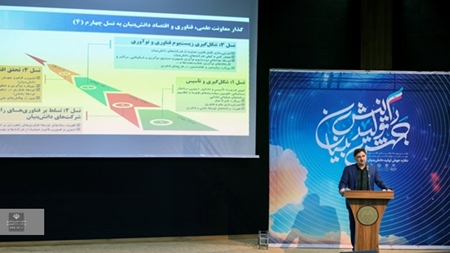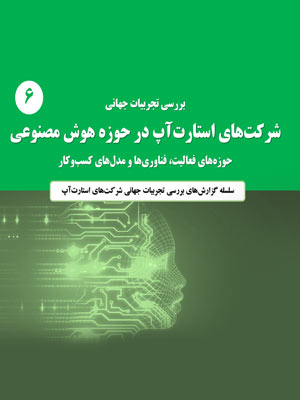Dehghani in the first regulatory event of the knowledge-based production leap law:
The fourth generation of the Vice Presidency of Science is the generation of realizing the knowledge-based economy
The vice president of science, technology and knowledge-based economy stated that with the promulgation of the progressive knowledge-based production leap law, the fourth generation of the activity in the Vice Presidency of Science has begun as the generation of knowledge-based economy, emphasizing: with the implementation of the provincial cut of knowledge-based economy and decentralization from Tehran, we will witness a big jump in the knowledge-based production of the provinces.

According to the Communication and Information Center in the Vice Presidency of Science, Technology and Knowledge-Based Economy, Ruhollah Dehghani said in the first monitoring event of the Knowledge-Based Production Leap Law: The country has experienced four generations in the Vice Presidency of Science as an executive and development body for science and technology. It was the first generation of science and technology discourse and the establishment of this literature in the country. In the second generation, a comprehensive scientific map of the country and technology development headquarters were formed in fields such as nanotechnology and bio-technology.
In the third generation, the law approved in 2010 was implemented well, the result of which was the quantitative and qualitative jump of knowledge-based companies and the creation of a series of infrastructures. In the following, the need-oriented and demand-oriented approach was established in technology plans, and with the progressive law of leapfrogging the production of the fourth generation of scientific assistants, it can be the generation of realizing the knowledge-based economy.
The vice president of science and technology further stated: protecting the national market and developing the export of knowledge-based products was a challenge. The income of knowledge-based companies in 2013 was about 200 billion tomans, which has now reached 450 billion. This ecosystem has changed and needs a new mechanism. The law of 2010 provides support that aims to develop and promote technology, but the new law has a knowledge-based economy approach. All executive regulations of this law were approved in the first year. The president announced his readiness to convene the meetings of the Supreme Steering Council of Knowledge Foundation and has held two meetings so far.
The Vice President of Science further emphasized: the working group under the supervision of the steering council has held about 20 meetings so far. Some examples of the achievements of this law include the discussion of producing knowledge-based products and abandoning tender procedures. The equivalent of 160 million dollars was signed for the first time with knowledge-based companies, which is about 1.3 billion dollars in currency savings. The effect of the approval of this law has also been effective in promoting the innovation fund. In the board of trustees of the fund, the capital increase of the fund to 100 Hemats was approved. In the past years, the fund's budget allocation has not been complete.
Dehghani added: One of the important tools of the knowledge-based production leap law is the cooperation of the Innovation Fund with banks, which we hope will be realized soon. One of the criticisms that have always been is that we are in Tehran's science and technology debate, but this law implies the extensive development of the knowledge-based economy and a provincial cut has been considered for the development of the knowledge-based economy. Our prediction is to have a leap in knowledge-based production in the country's provinces by decentralizing from the center. After the Knowledge-Based Production Leap Law, the audience of the Vice Presidency of Science has changed from small companies to large companies and large industries. That is, large companies became interested in this field based on the law of mutation. If the Parliament has firm support, just as the implementation of the 2010 Knowledge-Based Ecosystem Law, the full implementation of the Knowledge-Based Law will lead us to significant annual growth in the field of knowledge-based economy.














comment